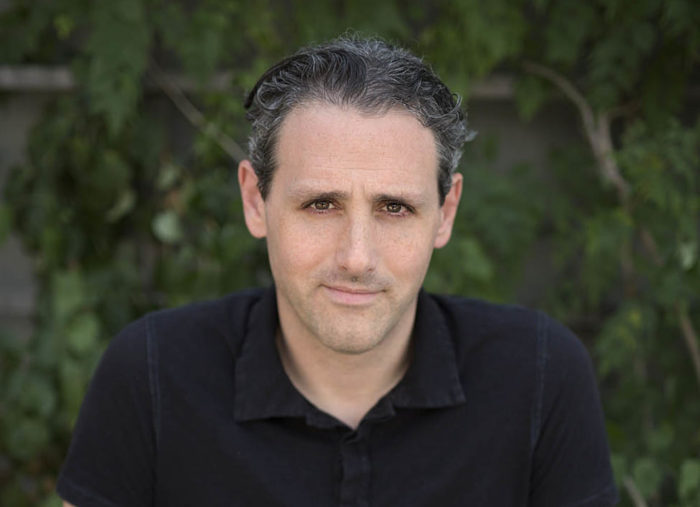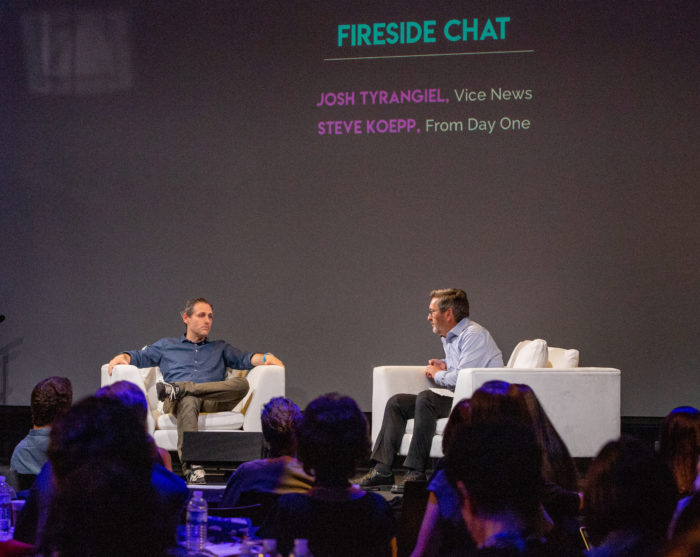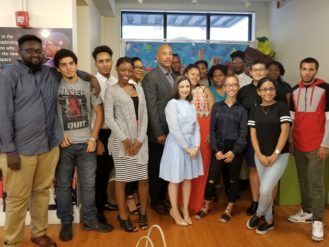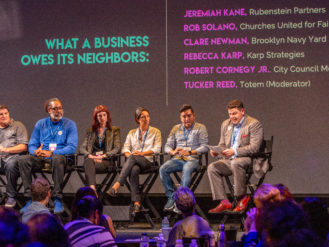‘If You Don’t Shove the Audience, They’ll Fall Asleep’
Vice's news chief talks about the power of reporting, millennial journalists, and why the best stories are complicated
Josh Tyrangiel, the head of Vice Media's news division (Photo by Madeleine Peters/VICE )
Each media company is like a distinct civilization, with many of the newer ones having a generational focus. Few journalists have seen as much of that range as Josh Tyrangiel, executive vice president of content at Williamsburg-based Vice Media. Earlier in his career, he had been chief content officer at Bloomberg and deputy managing editor of Time.
With its millennial audience in mind, Tyrangiel’s newsroom has reinvented such formats as the evening news, with Vice News Tonight on HBO. At From Day One, a Sept. 13 conference on business and society, Tyrangiel spoke about generational changes in the news business with Steve Koepp, editor of The Bridge, a co-producer of the event. A few of Tyrangiel’s insights:
On the Leap from Legacy Media
Tyrangiel found it invigorating to join a newsroom full of youthful journalists. “There is a real attitude shift that I found incredibly refreshing, as I was entering the middle of my career,” he said. “People at Vice do not give a shit what you did before you got there. They’re not going to Wikipedia you. They want to know what you can do for them today, and that keeps you really really fresh.”

Tyrangiel spoke with The Bridge‘s editor Steve Koepp at the conference (Photo by Gretchen Robinette)
Even as the media industry has been buffeted by change, Tyrangiel said talented young people still want to be journalists. “Most people who come through the door have a natural gift of one thing and have backed it up with knowledge of two to three sets of craft. They’re adapting really quickly,” he said. But there’s one area where jobs are going begging, he said: “It’s very difficult to find skilled editors of text.”
Tyrangiel said he feels concern, though, on behalf of young journalists in a field that will most likely continue to be turbulent. “When you’re thrust at a relatively young age to be a pater familias for this group, you think, ‘What am I going to do for these kids?’ I don’t have an answer for that.” He added: “I don’t know what journalism is going to look like in five years.”
An Emphasis on Reporting
With a show like Vice News Tonight, whose behind-the-scenes report on white nationalists in Charlottesville last year drew national acclaim, Vice is trying to transcend the clickbait and lightweight content that have proliferated in digital media. “If you came of age after 2007-08, you were conditioned around the media environment where there was always a race to the bottom,” Tyrangiel said.
The half-hour nightly broadcast is based heavily on field reporting, in contrast with cable-news networks that fill much of their airtime with talking heads in studios. With that content, “You’re up to speed, but you’re not getting the endorphin kick,” said Tyrangiel. “If you don’t shove the audience, they’ll fall asleep,” he added. “News is stuff you actually don’t know; news is not repeating outrage; not [reporting] stuff you probably heard before.”
Young Journalists and Moral Clarity
While the journalists at Vice come from varied backgrounds, Tyrangiel said, “What seems to be fairly common among youth is that they seek moral clarity. They’re after ideas that allow them to order the universe into things that are good and things that are bad,” he said.
The pursuit of simplicity, however, may be counterproductive. “My only real bias is towards complexity,” Tyrangiel said. “I am annoyed and disappointed when stories are flat.”
“I think that the world is full of rational actors, and our job is to understand what’s behind their rationale,” he said, adding, “Since we have no anchor [person], we have to show, we cannot tell.”
The legwork and research of pre-production, he said, is a crucial part of putting together stories that reflect the world’s complexities. “If you get that phase right, you can avoid the so-called advocacy journalism.” In the celebrated Charlottesville piece, said Tyrangiel, the alt-righters “hung themselves” with the behavior and comments that were caught on camera.
And never underestimate the power of facts, even in a post-truth political era. “Data properly organized is a convincing storytelling device,” said Tyrangiel.
To Hear Good Ideas, Be Accessible
Tyrangiel said he believes in putting the smallest amount of distance between people with ideas and decision makers. At Vice’s headquarters, he sits at a small desk in a basement-level newsroom. “If a reporter has an idea,” he said, “they know where I am, they know how to give it to me, and it goes from what they’re thinking about to approval in an hour.”













